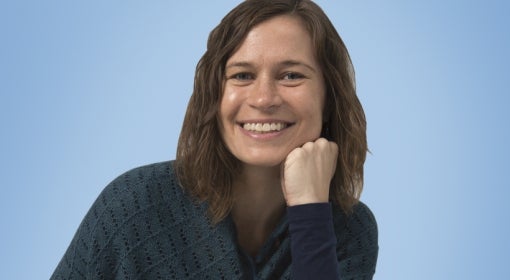All eyes are on the award-winning writer seated behind a table in the Humanities Center on the sixth floor of the Cathedral of Learning. Tall, lean, and graceful, Ta-Nehisi Coates speaks confidently, punctuating his words with his hands. They flutter like batons, helping him command the music of his thoughts.
Coates is headlining a colloquium about race and politics in his new work. He is a national correspondent for the Atlantic, a 2015 MacArthur “genius” Fellow, and a winner of the National Book Award for his best-selling memoir, Between the World and Me. Within the diverse crowd are students, local authors, nurses, librarians, editors, English professors, and chemists. They fill every chair in the room.
Coates has come to Pitt on the invitation of the University’s Pittsburgh Contemporary Writers Series (PCWS). Later tonight, he will give a free reading and talk in the William Pitt Union to an enthusiastic audience so large that the appointed overflow room will, well, overflow. But he’s spending this morning engaged in a smaller discussion, hosted in partnership with Pitt’s Humanities Center and the PCWS.
Now in its 17th year, the PCWS is connected to the Department of English, and draws notable fiction, nonfiction, and poetry authors to Pitt each year. Through the program, writers not only share their work, but also intellectually engage with students and the Pittsburgh community on complicated social, political, and professional issues. The interactions help the series to highlight and examine the connection between art and critical thinking.
Coates is a prime example of this connection, says Sten Carlson, a PCWS director and lecturer in Pitt’s Department of English. The author uses the power of words to touch on everything from fatherhood and fame to democracy and race in America.
As the conversation takes off in the Humanities Center, Coates gets a familiar question from an audience member. As a Black man whose journalism and creative work often reflect on the spectrum of Black experiences, including topics like slavery, segregation, and violence, does he feel burdened by the responsibility to represent race?
No, says Coates. Despite the weight of these issues, he doesn’t feel confined by writing about race. That’s not to say that he isn’t open to other stories, but he prefers to focus on the subjects he finds most important.
“I feel as if I’m playing my music and my music is as good as anybody else’s music,” he says.
For Coates, his “music” helps him explore the rhythm and blues of Black lives. He relishes the task, he says, because he believes that the Black experience is a credible lens through which to explore the complexities of power and how people shape democracy.
“At this political moment, we thought about the benefit and necessity of having a conversation about race,” says Carlson after the colloquium, reflecting on what inspired PCWS to invite the author to campus. “We thought about Coates, and the way he situates his work in history in such a vivid way. His ideas are accessible.”
The colloquium participants appear to agree. Some linger in the room, talking between themselves, the melodies of Coates’s ideas echoing in their ears.
This article appeared in the Winter 2018 issue of Pitt Magazine.




